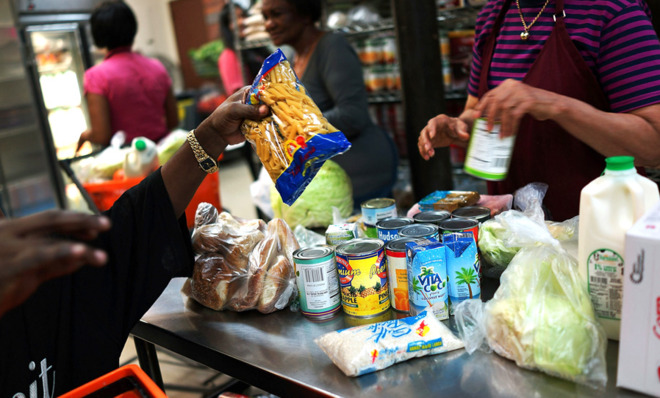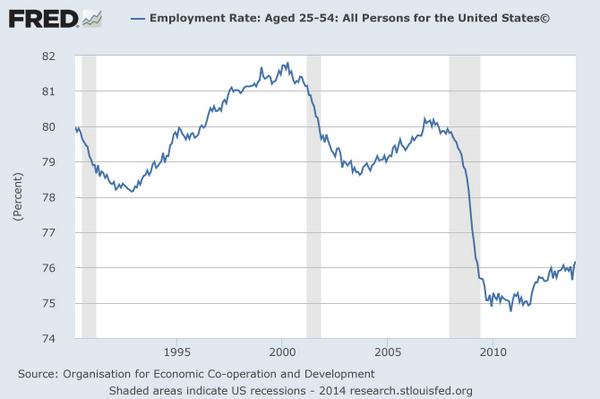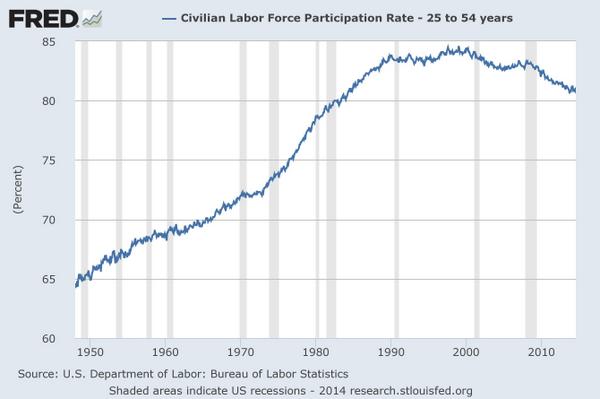America is running out of jobs. It's time for a universal basic income.
The politics of a guaranteed income get a lot easier when you acknowledge that the U.S. is no longer the land of opportunity


A free daily email with the biggest news stories of the day – and the best features from TheWeek.com
You are now subscribed
Your newsletter sign-up was successful
Free money for everyone!
With weak job growth, rising poverty, and the rich continuing to devour nearly all economic growth, it's an idea that is gaining more credence. Arguments for a universal basic income (UBI) — in which everyone without exception would receive an equal stipend — have flourished in policy-centric areas of the internet, including The Week. Advocates of UBI see it as a blunter, more effective means of reducing poverty and shrinking the inequality gap.
But even if UBI proponents are right on the merits, Tyler Cowen argues that the politics of the issue are not favorable.
The Week
Escape your echo chamber. Get the facts behind the news, plus analysis from multiple perspectives.

Sign up for The Week's Free Newsletters
From our morning news briefing to a weekly Good News Newsletter, get the best of The Week delivered directly to your inbox.
From our morning news briefing to a weekly Good News Newsletter, get the best of The Week delivered directly to your inbox.
Under most plausible assumptions about the Basic Income level, most people would not be recipients, nor would they expect to be potential net gainers from the program. And in general voters put much more importance on common-sense notions of "desert" than do economists. So I think the "why send money to people who aren't working?" intuition will crowd out the "I want to think of myself as someone who helps other people" feeling. [Marginal Revolution]
Let's set aside Cowen's erroneous assertion that UBI would benefit only a certain few — the whole idea is that everyone would be included. He does have a point that UBI is politically implausible. Conservatives, in particular, typically propose policies that would slash social insurance while sharply cutting taxes on the rich. And even fairly liberal Democrats are uncomfortable with programs that straight-up transfer cash unless it goes to retired people; recall that it was President Clinton who "reformed" traditional welfare into a program that helps almost no poor people.
However, it is a mistake to view these attitudes as cast in stone. The idea that work is a bedrock of society, that absolutely everyone who is not too old, too young, or disabled must have a job, was not handed down on tablets from Mount Sinai. It is the result of a historical development, one which may not continue forever. On the contrary, based on current trends, it is already breaking down.
The history of nearly universal labor participation is only about a century and a half old. Back in the early days of capitalism, demand for labor was so strong that all the ancient arrangements of society and family were shredded to accommodate it. Marx's Capital famously described how women and very young children were press-ganged into the textile mills and coal mines, how the nighttime was colonized for additional shifts, and how capitalists fought to extend the working day to the very limits of human endurance (and often beyond).
The resulting misery, abuse, and wretchedness were so staggering, and the resulting class conflicts so intense, that various hard-won reforms were instituted: the eight-hour day, the weekend, the abolition of child labor, and so forth.
A free daily email with the biggest news stories of the day – and the best features from TheWeek.com
But this process of drawing more people into the labor force peaked in the late 1990s, when women finally finished joining the labor force (after having been forced out to make room for returning veterans after World War II). The valorization of work as the source of all that is good in life is to a great degree the result of the need to legitimate capital's voracious demand for labor.
These days, capital's demand for labor is looking very, very soft. During the Great Recession, the prime working-age employment rate crashed, and has barely budged since:

As an obvious consequence, the labor force participation rate (the percentage of people working or looking for work) has been steadily declining:

Why this is happening is an interesting question. Undoubtedly the most important part of the story is poor macroeconomic management: Aggregate demand collapsed in 2008, and due to centrist and conservative obstruction, the policy response was insufficient.
However, there are other trends that may be interacting with and exacerbating this original sin. Automation and globalization had already largely hollowed out America's manufacturing employment base; most jobs created during this "recovery" have been in crappy low-wage work. And when one takes automation to its obvious logical end, it's hard not to conclude that robots will soon be putting just about everyone out of a job.
The reality of this situation is chewing at the roots of American politics. The fundamental bargain of American society is that for anyone willing to hustle, there is a decent job to be found, or one that will at least prevent abject destitution. It underpins our national mythos as the land of opportunity and self-reliance. It has always been less true than anyone wanted to admit, but for an increasingly large fraction of the population — start with the 16 percent of Americans who regularly don't have enough to eat — it's a sick joke.
Therefore, one can easily imagine the historical process described by Marx going in reverse. In today's labor market, where there are still twice as many job seekers as job openings, the constant conservative carping about the "dignity of work" sounds more jarring and vindictive by the day.
As someone with a nice, stimulating job, I agree that work can help people flourish. But in an economy that is flatly failing to produce enough jobs to satisfy the need, a universal basic income will start to seem more plausible — even necessary.
Ryan Cooper is a national correspondent at TheWeek.com. His work has appeared in the Washington Monthly, The New Republic, and the Washington Post.
-
 The Olympic timekeepers keeping the Games on track
The Olympic timekeepers keeping the Games on trackUnder the Radar Swiss watchmaking giant Omega has been at the finish line of every Olympic Games for nearly 100 years
-
 Will increasing tensions with Iran boil over into war?
Will increasing tensions with Iran boil over into war?Today’s Big Question President Donald Trump has recently been threatening the country
-
 Corruption: The spy sheikh and the president
Corruption: The spy sheikh and the presidentFeature Trump is at the center of another scandal
-
 The billionaires’ wealth tax: a catastrophe for California?
The billionaires’ wealth tax: a catastrophe for California?Talking Point Peter Thiel and Larry Page preparing to change state residency
-
 Bari Weiss’ ‘60 Minutes’ scandal is about more than one report
Bari Weiss’ ‘60 Minutes’ scandal is about more than one reportIN THE SPOTLIGHT By blocking an approved segment on a controversial prison holding US deportees in El Salvador, the editor-in-chief of CBS News has become the main story
-
 Has Zohran Mamdani shown the Democrats how to win again?
Has Zohran Mamdani shown the Democrats how to win again?Today’s Big Question New York City mayoral election touted as victory for left-wing populists but moderate centrist wins elsewhere present more complex path for Democratic Party
-
 Millions turn out for anti-Trump ‘No Kings’ rallies
Millions turn out for anti-Trump ‘No Kings’ ralliesSpeed Read An estimated 7 million people participated, 2 million more than at the first ‘No Kings’ protest in June
-
 Ghislaine Maxwell: angling for a Trump pardon
Ghislaine Maxwell: angling for a Trump pardonTalking Point Convicted sex trafficker's testimony could shed new light on president's links to Jeffrey Epstein
-
 The last words and final moments of 40 presidents
The last words and final moments of 40 presidentsThe Explainer Some are eloquent quotes worthy of the holders of the highest office in the nation, and others... aren't
-
 The JFK files: the truth at last?
The JFK files: the truth at last?In The Spotlight More than 64,000 previously classified documents relating the 1963 assassination of John F. Kennedy have been released by the Trump administration
-
 'Seriously, not literally': how should the world take Donald Trump?
'Seriously, not literally': how should the world take Donald Trump?Today's big question White House rhetoric and reality look likely to become increasingly blurred
